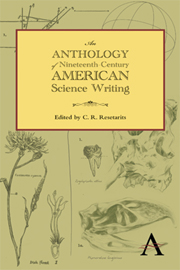Book contents
- Frontmatter
- Contents
- Preface
- Part One 1800–1846 Naturals and Naturalists
- Part Two 1846–1876 Warriors
- Part Two Introduction
- “On the Fossil Horses of America,” Proceedings of the Academy of Natural Sciences of Philadelphia (1847)
- “A Flora and Fauna Within Living Animals” (excerpt), Smithsonian Contributions to Knowledge (1853)
- “Examination of the Radiations of Red-Hot Bodies. The Production of Light by Heat” (excerpt), American Journal of Science and Arts (1847)
- “Section IX: Range of the Geographical Distribution of Animals,” Essay on Classification (1857)
- “On the Origin of Species” (excerpt), American Journal of Science (1860)
- “Darwin on the Origin of Species,” Atlantic Monthly (1860)
- “Sequoia and Its History” (excerpt), American Naturalist (1872)
- “On the Origin of the Geographical Distribution of Crustacea” (excerpt), Annals and Magazine of Natural History (1856)
- “On Cephalization” (excerpt), New Englander (1863)
- “On some Results of the Earth's Contraction from cooling, including a discussion of the Origin of Mountains, and the nature of the Earth's Interior” (excerpt), American Journal of Science (1873)
- “On Comets and Meteors,” Proceedings of the American Philosophical Society (1869)
- “Linear Associative Algebra,” A Memoir read before the National Academy of Sciences in Washington, 1870 (excerpt), American Journal of Mathematics (1881)
- “The Laws of Organic Development” (excerpt), American Naturalist (1871)
- “Fossil Horses in America,” American Naturalist (1874)
- “Odontornithes, or Birds with Teeth,” American Naturalist (1875)
- “The Genesis of Species” (excerpt), North American Review (1871)
- Part Three 1876–1900 Scientists
- Bibliography
“Linear Associative Algebra,” A Memoir read before the National Academy of Sciences in Washington, 1870 (excerpt), American Journal of Mathematics (1881)
from Part Two - 1846–1876 Warriors
Published online by Cambridge University Press: 05 June 2012
- Frontmatter
- Contents
- Preface
- Part One 1800–1846 Naturals and Naturalists
- Part Two 1846–1876 Warriors
- Part Two Introduction
- “On the Fossil Horses of America,” Proceedings of the Academy of Natural Sciences of Philadelphia (1847)
- “A Flora and Fauna Within Living Animals” (excerpt), Smithsonian Contributions to Knowledge (1853)
- “Examination of the Radiations of Red-Hot Bodies. The Production of Light by Heat” (excerpt), American Journal of Science and Arts (1847)
- “Section IX: Range of the Geographical Distribution of Animals,” Essay on Classification (1857)
- “On the Origin of Species” (excerpt), American Journal of Science (1860)
- “Darwin on the Origin of Species,” Atlantic Monthly (1860)
- “Sequoia and Its History” (excerpt), American Naturalist (1872)
- “On the Origin of the Geographical Distribution of Crustacea” (excerpt), Annals and Magazine of Natural History (1856)
- “On Cephalization” (excerpt), New Englander (1863)
- “On some Results of the Earth's Contraction from cooling, including a discussion of the Origin of Mountains, and the nature of the Earth's Interior” (excerpt), American Journal of Science (1873)
- “On Comets and Meteors,” Proceedings of the American Philosophical Society (1869)
- “Linear Associative Algebra,” A Memoir read before the National Academy of Sciences in Washington, 1870 (excerpt), American Journal of Mathematics (1881)
- “The Laws of Organic Development” (excerpt), American Naturalist (1871)
- “Fossil Horses in America,” American Naturalist (1874)
- “Odontornithes, or Birds with Teeth,” American Naturalist (1875)
- “The Genesis of Species” (excerpt), North American Review (1871)
- Part Three 1876–1900 Scientists
- Bibliography
Summary
Mathematics is the science which draws necessary conclusions.
This definition of mathematics is wider than that which is ordinarily given, and by which its range is limited to quantitative research. The ordinary definition, like those of other sciences, is objective; whereas this is subjective. Recent investigations, of which quaternions is the most noteworthy instance, make it manifest that the old definition is too restricted. The sphere of mathematics is here extended, in accordance with the derivation of its name, to all demonstrative research, so as to include all knowledge strictly capable of dogmatic teaching. Mathematics is not the discoverer of laws, for it is not induction; neither is it the framer of theories, for it is not hypothesis; but it is the judge over both, and it is the arbiter to which each must refer its claims; and neither law can rule nor theory explain without the sanction of mathematics. It deduces from a law all its consequences, and develops them into the suitable form for comparison with observation, and thereby measures the strength of the argument from observation in favor of a proposed law or of a proposed form of application of a law.
Mathematics, under this definition, belongs to every enquiry, moral as well as physical. Even the rules of logic, by which it is rigidly bound, could not be deduced without its aid. The laws of argument admit of simple statement, but they must be curiously transposed before they can be applied to the living speech and verified by observation.
- Type
- Chapter
- Information
- An Anthology of Nineteenth-Century American Science Writing , pp. 167 - 170Publisher: Anthem PressPrint publication year: 2012



